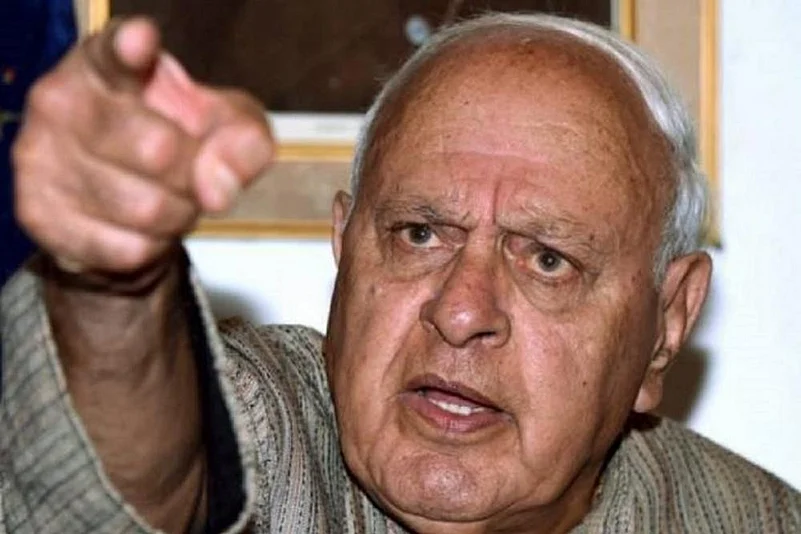National Conference president Dr. Farooq Abdullah Monday said any attempt to dilute the Article 35 (A) could trigger an explosive situation that will be nothing as compared to 2008 Amarnath land row protests.
Mass protests of 2008 against transfer of forest land to Shri Amarnath Shrine Board led to fall of Congress led government in Jammu and Kashmir.
Farooq Abdullah Monday chaired a meeting of opposition parties to devise a strategy how to counter any move to tinker with Article 35 (A).
He said any attempt to tinker with Article 35 (A) is going to affect people from all the regions of the state including Kashmir, Jammu and Ladakh.
Advertisement
The meeting was attended by NC working President Omar Abdullah, state Congress Chief G A Mir, CPIM leader M Y Tarigami, Chairman PDF Hakeem Mohammad Yaseen, and NC Provincial President Devender Rana and others at his Gupkar residence. He expressed anguish over what he called “insensitive and dangerous” approach towards J&K’s special status.
He was referring to Government of India’s approach towards Supreme Court’s recent decision on a PIL that called for abrogation of Article 35-(A) of Constitution of India.
Dr Abdullah said, “It is not just a Kashmir centric issue as they are trying to project it as. The Article is as much important for Kashmiris as it is for people in Jammu and Ladakh. It was Maharaja Hari Singh who in 1927 had brought in the ownership laws of the state, for welfare of state subjects."
Advertisement
Warning BJP and RSS of the dangerous consequences if Article 35 (A) is tinkered with, Dr Abdullah said, “This issue has the potential to further deteriorate the situation in our state and GoI will be squarely responsible for that. The Amarnath land row agitation in 2008 was nothing as compared to the explosive repercussions it is bound to create in the state. I therefore call upon all like minded and well intentioned forces in the country to join hands and help us stop this RSS aggression.”
“With the way things are moving at the centre viz a viz J&K special status, it seems a clear cut case of demographic change is in the making. BJP and RSS are working overtime to attack the autonomous nature of our state.”
He said that the Article must not be given a regional colour and reiterated that the any fiddling with Art 35 (A) was not only dangerous but put a “big responsibility on shoulders of those who have always worked in direction of keeping the state away from regional frenzy politics”.
Omar Abdullah later tweeted that to oppose removal of #35A is not anti-Jammu or anti-Ladakh. “It's removal will have grave consequences for people living in #Jammu & #Ladakh.”
“It's amazing that people who talk about protecting Dogra heritage & culture forget that J&K's state subject laws were Maharaja's decision.”
He said Maharaja Hari Singh introduced State Subject laws to protect lands and jobs, primarily to safe guard Jammu from people of neighbouring states.
Advertisement
“Long before removal of #35A effects Kashmiriyat it will do grave damage to Dogriyat - the identity & culture of the Dogras”, he added.
“So our opposition to any dilution of #35A is not to benefit one region at the cost of another but to safeguard the state as a whole.”
In 2014, an NGO We the Citizens filed a writ petition in the Supreme Court. The petition sought the striking down of Article 35 (A). The J&K coalition government of the Peoples Democratic Party and BJP filed a counter-affidavit and has sought dismissal of the petition. However, the central government did not file the counter so far.
Advertisement
Last month, Attorney General K K Venugopal told the bench of Chief Justice J S Khehar and Justice D Y Chandrachud that the petition raised Constitutional and legal issues. The Apex Court later referred the matter to a three-judge bench and set six weeks for final disposal.




















